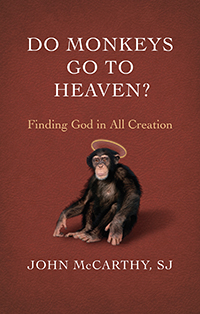
Galaxies and God: Thumbs Up and Thumbs Down
 In honour of tonight’s launch of Do Monkeys Go to Heaven? by Fr. John McCarthy, we share this short excerpt from the book for you to enjoy. If you’re in the Toronto area this evening, join us at Regis College. We will be there, with Fr. McCarthy, from 5:30 – 7:00 to celebrate the publication of his newest book.
In honour of tonight’s launch of Do Monkeys Go to Heaven? by Fr. John McCarthy, we share this short excerpt from the book for you to enjoy. If you’re in the Toronto area this evening, join us at Regis College. We will be there, with Fr. McCarthy, from 5:30 – 7:00 to celebrate the publication of his newest book.
“With the help of the Hubble telescope, a team of astronomers has discovered what they say is the earliest galaxy ever glimpsed in the heavens. A smudge of galactic light on a Hubble image clocks in at a mere 480 million years after the Big Bang – light from a fledgling galaxy 13.3 billion years ago.
That story is wondrous enough. More intriguing, however, were the comments posted on the CBC website that announced the stellar news. One early commentator weighed in with the following response: “In the beginning, God created the heavens and the earth. It’s an amazing discovery – looking at the very beginning of God’s work.”
What surprised me was the next comment. It was soon removed by the moderator of the site. This comes as no surprise, given that the writer, in strident, self-righteous anger, thundered what the *&?$ this nonsense was all about. God has nothing to do with this story, and besides, all priests and bishops are pedophiles and when are we going to grow up and move beyond such infantile and asinine thinking. The author ended the diatribe with an emphatic “Frigg!!!!” One other commentator stated that the discovery shows that “science rules,” while another assuredly noted that “secular society rules” and that “it will be the future of man.”
In case you’re wondering, the “God” listing, at last count, had received nineteen “thumbs up” – and 184 “thumbs down.” The energetic riposte, on the other hand, had garnered just the opposite – 194 “thumbs up” and only four “thumbs down.”
I admit that anonymous responses to Internet news stories are not the best sources of civil or reasoned discourse. However, they do suggest a certain public mood.
I can calmly read the God statement and appreciate its content. The Christian doctrine of creation welcomes this scientific discovery. Creation, as a theological notion, is not fully encompassed by the “how” of the origins of the universe.
The person commenting on God as Creator seemed to think the same, given his or her amazement at the discovery of this early galaxy. His or her mind was open and flexible enough to absorb the wonder of science and the mystery of God at the same time. For the respondent, however, such seemed not the case. Missing was an openness to multiple layers of explanation where faith and science could learn from each other.
We seem to be slipping into what we could call a “poverty of discourse.” The world is no longer complex and mysterious, a wonder to behold. Rather, lines are being drawn in the sand. We’re on the hunt for who’s in and who’s out. Our world is shrinking to fit our minds – and in the process we truncate the rich variety and stuff of life.
There is only one world. For some reason, however, we seem increasingly unable to embrace the varied textures and depths of our world. Content with the superficial, we resist the depths of the deep. Easy and quick answers abound. Our refusal to ask all the needed questions is a precursor to a cycle of decline. Let us never shrink from questions. They are the foundations of faith.”
-Fr. John McCarthy, S.J.

